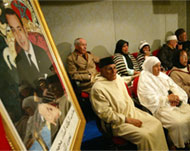Moroccan film eyes festival honours
Africa’s biggest celebration of cinema is being held this week in the capital of Burkina Faso.

“Creating film in Africa is part of a social movement – it can really change things,” Moroccan director Hasan bin Jillun said. His La Chambre Noire is being shown at the Fespaco festival in Ouagadougou on Monday.
The film, about imprisonment and torture in ’70s Morocco, is competing for the festival’s top prize, the Etalon d’Or de Yennenga, or Golden Stallion of Yennenga and is one of six North African films out of 20 short-listed feature-length films.
Bin Jillun is among several directors at the festival, which ends on 5 March, who have drawn inspiration from real-life events to create films which examine issues of human rights.
True story
Set in 1975, bin Jillun’s film is based on the true story of a young ex-communist party member who is kidnapped, imprisoned and tortured for his long-lapsed leftist leanings.
 |
|
A truth commission is hearing the |
“This happened to countless people in Morocco,” the director said. “It happened to close friends of mine, and to my cousin.”
Hundreds of Moroccans were arrested arbitrarily or tortured by security agents in the 1960s and ’70s, known as the “years of lead” because of the heavy-handed rule of late King Hasan.
Last December, an official truth commission opened to give victims of human-rights violations an unprecedented platform.
Bin Jillun, who spent three years researching his film, said it had a clear impact in the North African kingdom.
Compensation
“Since the film came out, the state has paid compensation to those who were detained,” bin Jillun, who has a reputation as a social campaigner, said.
“Creating film in Africa |
His 2001 film, Jugement d’une Femme, highlighted Moroccan women’s lack of rights and galvanised public opinion, leading the government to give women the right to contest ownership of homes in divorce battles.
Other films at Fespaco, or the Pan-African Cinema and Television Festival, also touch sensitive topics ranging from war and its aftermath through apartheid to colonialism.
The Hero, hotly tipped to take Fespaco’s top prize after picking up an award at the Sundance festival, follows a troubled Angolan war veteran who lost his leg to a mine and returned to the capital Luanda after 20 years of war.
“After Cambodia, Angola is the most mined country in the world,” director Zeze Gamboa said.
“It is estimated that there are 10 landmines to each person,” he said, adding that his film was inspired by a news picture of a wounded veteran in the street.